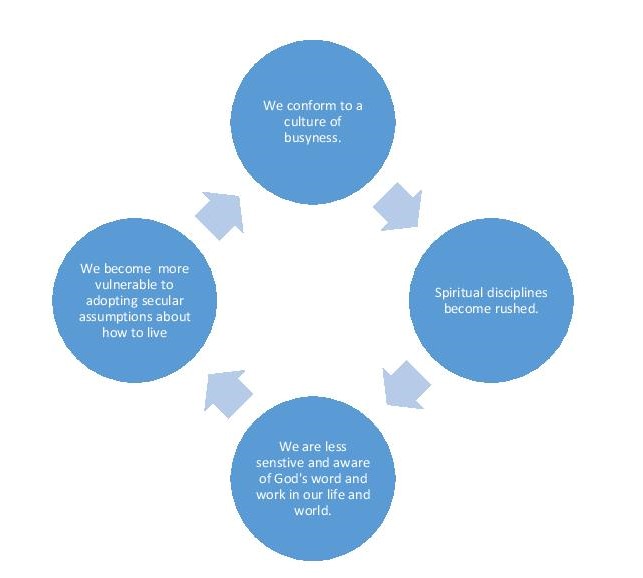“How has your week gone everybody?” This was a starter question in a small group in the ministers’ gathering. “Busy” is the response that rings around the [zoom break-out] room…
The life of ministry is busy and there were all kinds of events that people mentioned that they were working towards that filled their heads and days and diaries. We know that the life of ministry is very full. But there is a challenge about how we respond to that culturally. Being busy plays to our sense of achievement and being needed. Somehow saying ‘busy’ also feeds into a culture that equates busy with productive. A quick google search reveals how the whole culture we live in, not just those of us in the church, has been dealing with what has been called an obsession of busyness.
The wheel is turning and there is a counter-culture to busyness that is about wellbeing or self-care. There are countless areas of good-advice such as:
- Paying attention to ‘me-time’ that is put into the diary before it fills up with all the busy things we do;
- the importance of having enough sleep is a positive to be reinforced and a corrective to the narrative of bravely soldiering on with only a few hours sleep; ditto for days off;
- phone/ email / messaging technology-free times during the workday are recommended for more focussed creative efficiency;
- saying no
These (and other ideas) are not just ‘management’ ways of dealing with the busyness, but ways to help us reframe what we do and how we claim our time.
For those of us in ministry there is another dimension: how this frenetic activity impacts on our spiritual disciplines and our spiritual attentiveness to what God is doing in us and around us. Zigarelli talks of this as a vicious cycle, so as we assimilate the culture of busyness around us, we have less time for God, so less attentiveness to God, so are more vulnerable to greater adoption of the secular assumptions around us, leading to more conformity to the culture of busyness around us, and so on.
We could picture it like this:

A vicious cycle indeed. But this is not to beat us over the head, rather to help us start rethinking and reframing the ways that we look at our activities, and how we position our attention to what we would claim as the important aspects of our lives. One of the responses to COVID has been some people noticing time and giving themselves more opportunities. (Of course for others it meant being even more frenetic). But for our worship and ministry lives it has meant a re-orienting of what we spend time on. How will that help us as it becomes possible for our worship spaces to be open?
If indeed we have assimilated this culture of busyness, wherein our lives can we put our finger on things that may be more about our culture than our faith? If our diaries are stressed then let’s find creative ways for quiet space to deepen our connection and awareness of the presence of God in our lives. We can work to make sure that God is not marginalised in our busy lives, so we don’t become unthinkingly subject to our secular world.
As you think about the week ahead, how can you now mentally prepare yourself to think about it as something other than ‘busy’ for your own reframing? (I’m really looking forward to the time I’ll have to think about a couple of sermons for June and what I might learn in the preparing). What word(s) can you now queue up in your mind so that when people ask you how you are or how your week is going, you can have something other than ‘busy’ to say as your response?
Rev Dr Christine Sorensen
Presbytery Minister (Formation and Discipleship)
[email protected]
Reference:
Zigarelli, Michael. “Distracted from God: A Five-Year, Worldwide Study.” http://www.christianity9to5.org/distracted-from-god/
Image by William Iven on Unsplash.com
